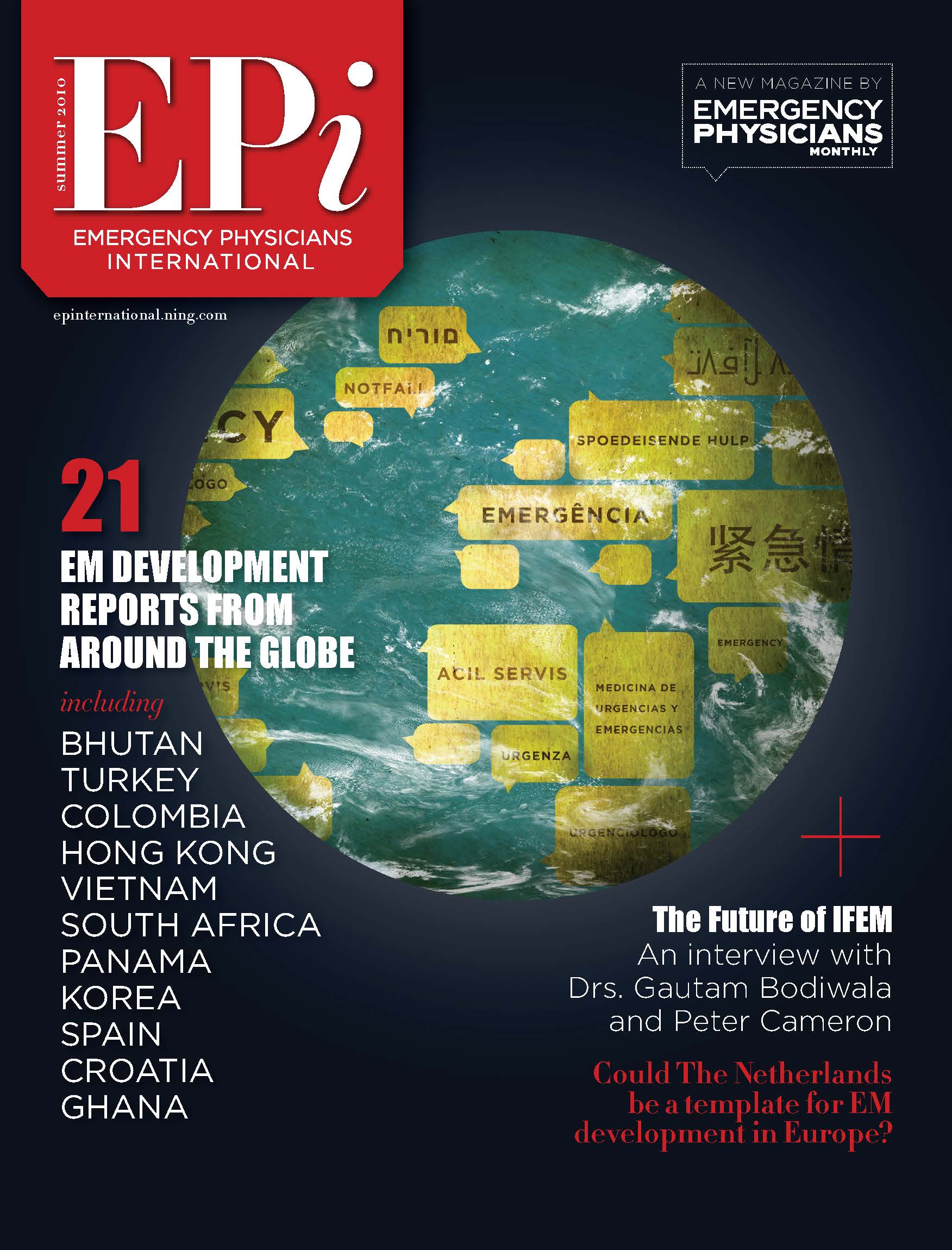Emergency Physicians in Kyiv Move Into Hospital, Brace for Missile Attacks
Dr. Vitaliy Krylyuk, an emergency physician at Kyiv Hospital of Emergency Medicine in Ukraine, reports that supplies and staff are currently available, yet they struggle to prepare for the unknown.
—
The following report is based on a conversation held with Dr. Vitaliy Krylyuk on Wednesday, March 16, 2022
by Logan Plaster
On February 23rd, Dr. Vitaliy Krylyuk was helping run a medical conference in Kremenets City, a small, picturesque town in the western region of Ukraine. Early in the morning of February 24th, as Krylyuk and his colleagues prepared for a series of EMS competitions, they heard the news. Russia was invading their country. Ukraine was under attack.
For about an hour they watched and waited, locked on the news reports. Then one by one, the emergency physicians and various staff got in their cars and left. Rather than stay in the relative safety of western Ukraine, or evacuate across the border, most drove east to their home cities, towards Russian tanks, towards uncertainty.
Dr. Krylyuk, knowing that his family was safe in rural Ukraine on the Romanian border, drove back to Kyiv where he works as an emergency physician at Kyiv Hospital of Emergency Medicine. The rest of his team did what they needed to do to make sure their families were safe, and then returned as well. Together, they moved into the hospital in order to be ready for what might come next.
The irony behind this single-mindedness of the emergency medicine staff is that there is no staffing shortage to speak of, at least not yet.
“We have fifteen people who now stay in the hospital around the clock,” says Krylyuk with a look of grim pride. “That’s my team, surgery, nurses, anesthesia, and others. Perhaps once or twice a week, we go to our homes for a break, and for a shower, or to visit family. Otherwise we stay in the hospital. We don’t know what time something will happen. They can start attacking Kyiv now, or in several hours, or tomorrow.”
Another irony in Kyiv is that since half the population has evacuated, medical needs have diminished, creating a calm before an expected storm. Fewer citizens means fewer basic health emergencies, like lacerations, heart attacks and strokes. And as of now, pre-hospital services and in-hospital care are running pretty smoothly.
“Now that half the population has evacuated, we have fewer patients to take care of,” says Krylyuk. “Our pre-hospital system is working every day to take care of these people, as are our hospitals and operating rooms. We have what we need in Kyiv. Near our hospital is a heart center, and they have a full staff right now. They can do operations. We might not do elective procedures, but all critical care is getting done without a problem. They are having trouble getting normal care in places like Kharkiv and Mariupol, because Russians destroyed these places. But in Kyiv right now ambulances are working and patients are safe.”
The same logic holds for medical supplies, which Krylyuk says are still well stocked, thanks to open lines of shipment to the west of the city.
The precarious calm in Kyiv – nightly missiles notwithstanding – means that Krylyuk and his team have time to consider and plan for their greatest challenge: the unknown.
“We have a document for how we need to deal with a mass casualty event, but it’s just theory,” he says, shaking his head. “When you start to work through how it will work, where patients will go, where is the red zone, how many trauma team members will we need, what is our blood supply? It’s not easy because we’ve never done it before.”
“At our hospital we have a doctor who is skilled at gunshot trauma and car crash trauma. So it’s not a problem for us to deal with these people. But what if there is a mass casualty event and they bring us children? We would need special supplies, which we don’t have. We are starting to think about what group of patients we can expect in a mass casualty situation. It’s not easy to prepare for something unexpected. Because of that, you’re under this stress every minute. It can happen, or not.”
The concern about pediatric casualties isn’t academic. In his address to the United States Congress, Ukrainian President Volodymyr Zelenskyy put the number of children killed at 97. To fill some of these gaps in experience, Krylyuk and his team have leaned on the international community.
“We have big support from ACEP, from EuSEM, from IFEM. These groups have sent supplies, educational materials, and protocols. It’s absolutely amazing that I can just call up people in the United States, Canada and Europe and get advice. We thank God we have so many friends in all countries.”
The emergency medicine team in Kyiv has settled into a tense rhythm. Every few hours (six to ten times a day, says Krylyuk), Ukrainians in Kyiv get alerts on their phones that a missile attack is possible. Patients who are able to walk move to one of the many basements or bomb shelters. Because Kyiv’s subway system was dug deep, it serves as a safe place for many to take shelter.
“This evening we expect a missile attack in Kyiv – as usual,” says Krylyuk. “I know one or two buildings were destroyed in Kyiv early this morning, but no one was injured. Now, everyone knows to hide in the basement and in bomb shelters in the evening.”
But the emergency medicine team stays where they are.
“At my hospital we don’t respond to many of these alarms,” says Krylyuk. “It’s impossible to leave the patients and go to a shelter. Maybe it’s not right, but most of our staff just stays in place and continues with their work. If you hear an alarm and you’re in the middle of an operation, you can’t stop. It’s impossible to relocate the patient to the basement, with all of their equipment and supplies.”
For 20 days Krylyuk and his team have been working under this stress of missile alarms on top of the daily toil of caring for patients. How do they handle the tension? They talk and tell jokes.
“It starts with talking openly about everything,” says Krylyuk with a weary smile. “People can talk about the news that scares them. I remind them that it was the Russian plan to take 2-3 days to surround and destroy Kyiv, but now it’s been 20 days and nothing has happened. Every day our army is beating them and there are less and less troops every day. There are many missiles hitting Kyiv, but not enough to destroy the city. We aren’t surrounded, we have open access to western Ukraine and get supplies every day. So I remind them to believe in Ukrainians.”
“Sometimes we just need to joke. We’ll joke about Ukraine and Russia being one nation – one history, one language. It’s a joke because it’s absolutely not true. Ukraine is an ancient nation. When we speak Ukrainian, Russians don’t understand us. We understand Russian because we are clever and we broaden our horizons every day. I encourage them to be proud of our nation.”
“I remind them that today, this day, our nation beat back the second largest army in the world. I understand. People are worried about their families. But we just talk, and joke, and it helps.”
The bigger question than the stress of today is the attack of tomorrow. Will more missiles find their targets in downtown Kyiv? Will Krylyuk’s emergency department be overrun with pediatric patients? Will they be called upon to care for Russian soldiers? As of yet, the team at Kyiv Hospital of Emergency Medicine hasn’t had to care for any injured Russian troops, but Krylyuk is quick to say that if and when this happens, enemy combatants will receive the same quality care as everyone else, in accordance with the Geneva Convention.
Or, worse, will medical providers be pushed to the point of taking up arms against their invaders? Krylyuk says that while that seems unlikely, he is ultimately willing.
“I recognize that this is not my main work. It will probably be better for me to be in the hospital than with a gun in the field. But if need comes, I can.”
At the end of the day, however, Kylryuk think this possibility is distant. Not because President Putin doesn’t have the desire to destroy his city, but because of his belief in the Ukraine’s strength. The conflict, he says, has made them even stronger.
“All Ukrainians who stayed in Kyiv or other cities, we believe in our country and our army,” says Krylyuk. “We believe that if we stay in the hospital and patients come in, they’ll have a chance to survive. If I evacuate to the west to some safe place, people will die. We don’t want to lose any of our people. We want to save as many injured people as possible. My friends and familiy outside of Kyiv tell me to go somewhere safer. But we’re here preparing for all. We know we are not safe here and could come under missile attack. But we are ready to fight even. If they destroy Kyiv, they destroy all of Ukraine. I understand that if they destroy Kyiv, the Russians will go to the western part of Ukraine and they can kill my father, my sister and my nephew, and so on. Each of us who says now in Kyiv it’s because we believe we will win.”







